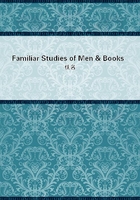
第45章
"As for the dispute about solitude and society," he thus sums up: "Any comparison is impertinent. It is an idling down on the plain at the base of the mountain instead of climbing steadily to its top. Of course you will be glad of all the society you can get to go up with? Will you go to glory with me? is the burden of the song. It is not that we love to be alone, but that we love to soar, and when we do soar the company grows thinner and thinner till there is none at all.
It is either the tribune on the plain, a sermon on the mount, or a very private ecstasy still higher up. Use all the society that will abet you." But surely it is no very extravagant opinion that it is better to give than to receive, to serve than to use our companions; and above all, where there is no question of service upon either side, that it is good to enjoy their company like a natural man. It is curious and in some ways dispiriting that a writer may be always best corrected out of his own mouth; and so, to conclude, here is another passage from Thoreau which seems aimed directly at himself: "Do not be too moral; you may cheat yourself out of much life so. . . . ALL FABLES, INDEED, HAVE THEIR MORALS; BUT THE INNOCENT ENJOY THE STORY."
V.
"The only obligation," says he, "which I have a right to assume is to do at any time what I think right." "Why should we ever go abroad, even across the way, to ask a neighbour's advice?" "There is a nearer neighbour within, who is incessantly telling us how we should behave. BUT WE WAIT FOR THE NEIGHBOUR WITHOUT TO TELL US OF SOME FALSE, EASIER WAY."
"The greater part of what my neighbours call good I believe in my soul to be bad." To be what we are, and to become what we are capable of becoming, is the only end of life. It is "when we fall behind ourselves" that "we are cursed with duties and the neglect of duties." "I love the wild," he says, "not less than the good." And again: "The life of a good man will hardly improve us more than the life of a freebooter, for the inevitable laws appear as plainly in the infringement as in the observance, and" (mark this) "OUR LIVES ARE SUSTAINED BY A NEARLY EQUAL EXPENSE OF VIRTUE OF SOME KIND." Even although he were a prig, it will be owned he could announce a startling doctrine. "As for doing good," he writes elsewhere, "that is one of the professions that are full. Moreover, I have tried it fairly, and, strange as it may seem, am satisfied that it does not agree with my constitution. Probably I should not conscientiously and deliberately forsake my particular calling to do the good which society demands of me, to save the universe from annihilation; and I believe that a like but infinitely greater steadfastness elsewhere is all that now preserves it.
If you should ever be betrayed into any of these philanthropies, do not let your left hand know what your right hand does, for it is not worth knowing." Elsewhere he returns upon the subject, and explains his meaning thus: "If I ever DID a man any good in their sense, of course it was something exceptional and insignificant compared with the good or evil I am constantly doing by being what I am."
There is a rude nobility, like that of a barbarian king, in this unshaken confidence in himself and indifference to the wants, thoughts, or sufferings of others. In his whole works I find no trace of pity. This was partly the result of theory, for he held the world too mysterious to be criticised, and asks conclusively: "What right have I to grieve who have not ceased to wonder?" But it sprang still more from constitutional indifference and superiority; and he grew up healthy, composed, and unconscious from among life's horrors, like a green bay-tree from a field of battle. It was from this lack in himself that he failed to do justice to the spirit of Christ; for while he could glean more meaning from individual precepts than any score of Christians, yet he conceived life in such a different hope, and viewed it with such contrary emotions, that the sense and purport of the doctrine as a whole seems to have passed him by or left him unimpressed. He could understand the idealism of the Christian view, but he was himself so unaffectedly unhuman that he did not recognise the human intention and essence of that teaching. Hence he complained that Christ did not leave us a rule that was proper and sufficient for this world, not having conceived the nature of the rule that was laid down; for things of that character that are sufficiently unacceptable become positively non-existent to the mind. But perhaps we shall best appreciate the defect in Thoreau by seeing it supplied in the case of Whitman. For the one, I feel confident, is the disciple of the other; it is what Thoreau clearly whispered that Whitman so uproariously bawls; it is the same doctrine, but with how immense a difference! the same argument, but used to what a new conclusion!
Thoreau had plenty of humour until he tutored himself out of it, and so forfeited that best birthright of a sensible man;